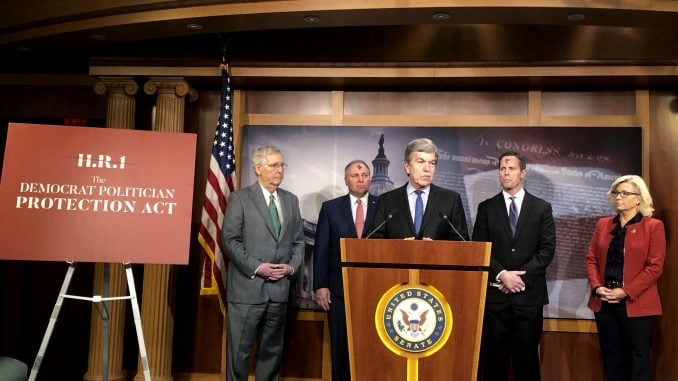
WASHINGTON, D.C. — Congressional Democrats, using their newfound majority, passed HR 1, the “For the People Act of 2019,” which they pitched as a way of getting the influence of money and corruption out of politics. Republicans in the House unanimously disagreed, with all voting against the bill in a straight party line vote of 234-193. Congressman Mark Walker (R-NC) released a statement on the bill, saying:
“While House Republicans remain committed to producing results, our colleagues across the aisle seem only interested in retaining power and resisting productivity. In an attempt to legislate electoral advantages for their candidates, House Democrats are attempting to force North Carolina taxpayers to pay for campaign ads for California politicians.”
Walker also released a tongue-in-cheek campaign video from a fake politician who tells the viewer, “So, as I use buzzwords like, ‘For the People,’ remember, with HR 1, hardworking Americans will get hammered into paying for bad campaign ads, like this one. I approve this message, but you paid for it.”
The statement and video both reference the part of HR 1 that would create “citizen owned elections” where public financing would ultimately mean campaign ad funding coming from tax revenue.
Congresswoman Zoe Lofgren (D-CA), who introduced the bill, described the HR 1 as, “a sweeping package of pro-democracy and anticorruption reforms to put power back in the hands of the American people by ending the dominance of big money in politics; making it easier, not harder, to vote; and ensuring that politicians actually serve the public interest.”
Hidden inside this phrasing, Republicans say, are proposals meant to increase Democrat power in a number of ways. Senate Majority Leader Mitch McConnell (R-Ky) has repeatedly dubbed the bill the “Democrat Politician Protection Act.”
In a press conference on the bill with other Senate Republicans, McConnell covered what, in his view are, “some of the highlights that are particularly offensive to average voters.” The first thing he mentioned was “using government money to subsidize campaigns,” the same issue Walker focused on.
McConnell then targeted voter fraud, bringing attention to the “ballot harvesting” problem, which he pointed out was illegal in North Carolina, but legal in California. He said this practice is likely why California “only has seven Republicans left,” out of its 53-member House delegation.
The majority leader mentioned North Carolina in reference to the NC-9 elections where Republican candidate Mark Harris was unable to have his apparent victory certified by the state board of elections after questionable ballot handling practices were discovered in Bladen County. McConnell believes this is just as harmful and much more prevalent in states like California where Democrats are happy to use the tactic to eliminate Republican opposition.
In addition to publicly funding elections, HR 1 is opposed by Republicans because it includes items like support for D.C. statehood, automatic voter registration, elimination of “discriminatory voter ID laws,” creation of an independent redistricting system to prevent gerrymandering, making election day a federal holiday and allowing convicted felons to vote.
In the Senate GOP press conference, as well as an op-ed in the Washington Post, Senate Majority Leader Mitch McConnell made clear the bill will be dead on arrival at the Senate, saying, “This is a terrible proposal, and it will not get any floor time in the Senate.”
